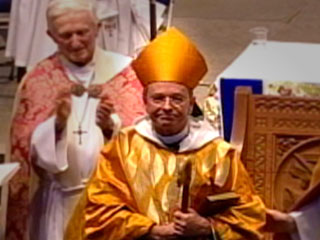Spreading the Word: For the Bible Tells Me So
by George Sax

During one of the recent televised Republican Presidential debates, an internet questioner demanded the candidates state whether they regarded the Bible as the unerring word of God. Each of them hastened to assure the debate audience of his belief in the Good Book’s inerrancy.
Daniel Karslake’s film examines what this religious literalism means to the lives of millions of gay Americans, and to their families and friends. In one of several moving sequences he’s captured, Mary Lou Wallner, an Arkansas mother and wife, recounts how she rejected her daughter’s lesbian orientation on religious grounds 10 months before her child committed suicide. Now, this courageous woman campaigns for the tolerance and acceptance she once so tragically avoided. In one scene, she and scores of other family members gather in front of the offices of religious rightist James Dobson’s Focus on the Family to protest his scripturally derived condemnations of gay relationships. (A critic of Dobson’s denunciatory intransigence observes that this man has no theological credential.)
Karslake—whose family has roots in Chautauqua County—presents some of the usual perps using scriptural authority to inveigh against people they regard as sinful sodomists. Jimmy Swaggart pounds out a hateful rant about the “abomination” and tells of his murderous impulse toward gays.
But, more often, Karslake has concentrated on the experiences of sociologically diverse families with gay offspring, all of them adherents of various faiths, and on the comments of religious leaders who counsel an interpretative approach to the Bible. Laurence Keene, a Disciples of Christ minister, says he retains a soft spot of literalists because he once was one. But, he cautions, “A fifth-grade understanding of the Bible is [only] okay for fifth graders.”
Karslake and his experts are willing to face up to the Levitical and New Testament condemnations of homosexuality, but they reject their relevance and morality. A young rabbi, Zachary Mayer, draws attention to Leviticus’ prohibition against combining linen and wool garments.
Karslake, a former TV producer whose first film this is, deftly alternates these authoritative explications of testament with the words of lay people bearing witness to crucial personal reassessments.
A Southern African-American pastor jokes that he once asked God to prevent his daughter from becoming “a slut” and his son “a faggot.” But “He reversed that,” the man says, chuckling. This man of Bible-based, old-time faith now celebrates his relationship with his lesbian daughter.
The tested, courageous people Karslake visits provide the most hopeful material in this humanely intelligent film.
Addendum: Last week I cited Harold Pinter’s screenplay for Elia Kazan’s adaptation of F. Scott Fitzgerald’s The Great Gatsby. The problem is, Kazan and Pinter collaborated on filming Fitzgerald’s The Last Tycoon. Francis Ford Coppola wrote Gatsby and Jack Clayton directed. Sorry.
|
Issue Navigation> Issue Index > v6n50: Last-Minute Holiday Gift Guide (12/13/07) > Spreading the Word: For the Bible Tells Me So This Week's Issue • Artvoice Daily • Artvoice TV • Events Calendar • Classifieds |









 Current Issue
Current Issue